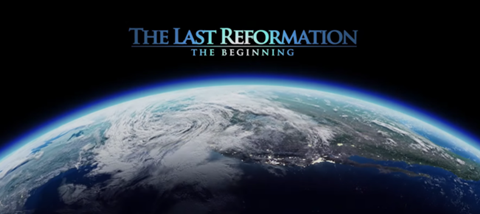
Baptisms in Japan and Thailand.
The speaking of tongues in Canada, Australia and the USA.
Miraculous healings in Sweden, South Africa, Israel, Denmark and the USA.
These are the opening scenes of a feature-length documentary released earlier this year called The Last Reformation.
"We, as a Church today, are standing in front of a new reformation," says Torben Søndergaard, founder of the movement which inspired the film, "a reformation where we are coming back to what we read in the book of Acts.”
The well-produced documentary intersperses footage of people receiving healing, deliverance, baptism and salvation, with comments from Torben and others on how this reflects the early Church as recorded in Acts. This is all part of what the movement believes is a modern-day reformation of the Church which they believe goes deeper than the one that took place in the 16th century.
To date the documentary is approaching a cool 400,000 views on YouTube. Clearly it is generating a lot of interest. Is this something we should all be hopping on board with or should we be staying well clear?
Firstly, I can understand the excitement The Last Reformation is generating. The number of people showing genuine surprise and joy at their healing or deliverance is plentiful and in some cases very touching. There are also many Christians who will likely share some, if not all, of the documentary’s frustrations with the modern-day Church, including the way it has become too institutionalised, and its longing to see a more faithful demonstration of what we read in Acts. To an extent, these are sentiments I can identify with, too.
The documentary offers a good and well-articulated focus on sin and the need for repentance, but its position on water baptism, where the implication is that its practice confers grace upon the recipient, is a concern. “What we’ve discovered is that baptism is not something that’s just sacramental, as far as being an outward sign of an inward reality,” Don Blizard explains. “We’re seeing that when you go into water, the Spirit of God is touching that.” He adds that water baptism is “both a bath and a burial” where the individual comes out “brand new and clean.” This then follows onto the believer being baptised in the Holy Spirit.
In support of this view are the many instances when repentance and baptism happened simultaneously in Acts, together with verses such as Acts 2:38 - “Repent and be baptised every one of you in the name of Jesus Christ for the forgiveness of your sins, and you will receive the gift of the Holy Spirit” (emphasis added). The difficultly with this is that it contradicts the wider Biblical teaching on salvation which makes is clear that it is “by faith in Christ and not by observing the law” (Galatians 2:16). Forgiveness comes through the regeneration that baptism symbolises and not the act of baptism itself. We need only look at the thief on the cross to demonstrate this (Luke 23:43).
This misunderstanding may explain why the documentary brushes aside the significance of the 16th century reformation. Integral to this was Martin Luther, whose overly scrupulous conscience for years drove him on a tormented and futile search for God’s favour. But to his liberation he eventually discovered that salvation is by faith alone and not, as The Last Reformation seems to be flirting with, works. Whilst the reformation was by no means faultless, Luther’s discovery still went to the very heart of what it means to know Jesus and was revolutionary for a Church being led astray by erroneous teaching. It deserved to be mentioned as such.
Furthermore, while the documentary’s criticism of the Church is warranted in part, its blanket criticism of things like church services and programmes suggests that they are overlooking how these are in fact avenues through which God is working powerfully today, a lot of it apart from signs and wonders. There are other points of theology and practice covered in the documentary and elsewhere that may, among some, raise additional concerns and questions.
Notwithstanding all of this, I do believe that God was genuinely meeting with people featured in the documentary. Some of the encounters may well have been fake or exaggerated, or more the product of an adrenaline rush, a manipulation of sorts or even another spirit. I don’t know. Maybe Derren Brown is able to help! But where the miraculous is concerned this could happen anywhere.
None of our churches are perfect, neither is our theology, but God still works in and through us even as he is seeking to change us. I also believe that the passion The Last Reformation and it supporters have for the Holy Spirit and his role in the Church’s life and witness, and their desire for the kingdom of God to grow, is a welcome one that many of us could learn from.
Click here to request a free copy of Premier Christianity magazine



























